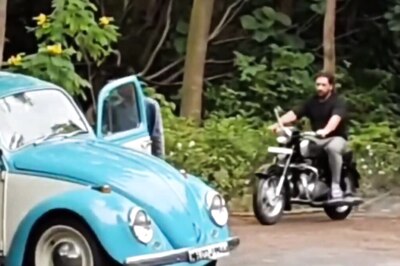
views
CHENNAI: Sugata Bose is a busy man. The Gardiner Professor of History at Harvard University has a choc-a-bloc schedule, as his book, His Majesty’s Opponent, releases all over the world. Prior to its launch release in the city, Netaji Subhas Chandra Bose’s grand-nephew takes some time out for a chat, speaking in a precise, clear voice about his journey writing a book on one of India’s most revered leaders.“His life was a fascinating one, that of an anti-colonial nationalist on the global stage. I felt I had to tell his story, complete with all the contradictions that filled it,” he says genially. “My father always said that for Netaji, his family was coterminous with his country.”The idea of a book had begun germinating a few years ago, but it took awhile for it to take shape. “I needed to grasp the key elements of European East and South East Asian and Indian Ocean History. I have to, after all, do justice to the global odyssey of Subhas Chandra Bose. My research needed to be perfect.” How difficult was it to go hunting after facts on Netaji, considering that the stirring events mentioned in the book are now many decades old? “So many of the men and women who worked with Netaji aren’t with us now, but there are many relics of their work left behind,” he explains. “My father, Sisir Kumar Bose, Netaji’s nephew, collected a lot of documents and photographs over five dedicated decades, and today, they form part of the Netaji Research Bureau.” The author had access to all this information but he still had to travel quite extensively to all the places Subhas lived to give a lively narrative. “I visited the guesthouse in Badgastein, where I went with my mother, brother and aunt, Anita Pfaff — Netaji’s only daughter. It was Subhas and his wife Emilie’s favourite resort in Austria. Only after I visited it, did I realise just why Subhas had been enchanted with the place,” he adds.Sugata might not have had the opportunity to interact with his famous relative but he does carry many fond memories of interviewing people like Abid Hasan, a close personal aide of Netaji in the Indian National Army. “I had the opportunity of listening to him, on the verandah of Woodburn Park, as he related his account of escaping with Subhas in a submarine in 1943 and later, too.” Quite a few people were happy that such a work had been written, including Dr Bose’s father. “Auntie Lakshmi is ill in the hospital now, but her daughter read it, and she liked it.” Auntie Lakshmi is, of course, Lakshmi Sahgal, better known as Captain Lakshmi, commander of the Rani of Jhansi Regiment of the INA. Anita Bose-Pfaff, Netaji’s daughter too, appreciated the work. Of all the launches held and appreciation received, Dr Bose feels that the one held on July 5 at Singapore, was the most poignant. “Netaji reviewed the parade of the INA on that date, and said it was the proudest day of his life. That made the launch of the book very special too. South India and Tamils in particular, have a great connection with Netaji — they joined the INA in great numbers, especially plantation workers in Malaya. They said that the INA gave them the first taste of human dignity.”Asked whether he will ever write historical fiction, he believes that “a non-fictional narrative need not be any less than a fictional narrative.” Besides, this is the 150th birth anniversary of Rabindranath Tagore; he is busy with lectures and presentations on the subject — “let’s see,” he says.His Majesty’s Opponent will be released today at 7pm in CPREEC Convention Centre, Eldams Road, Alwarpet.




















Comments
0 comment